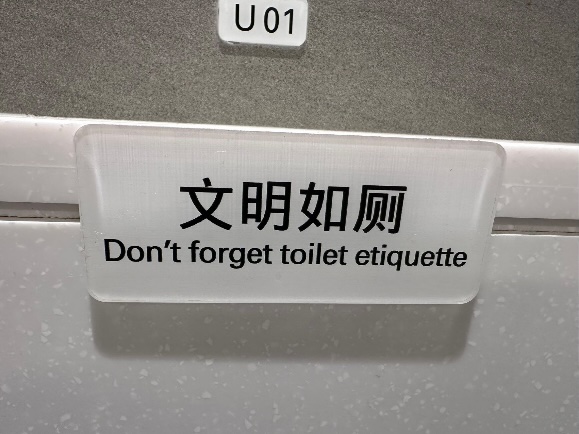Two for the toilet
« previous post | next post »
We've looked at the Chinese of the first item en passant before (here), but not in detail, and the English of this version merits investigation:
wénmíng rúcè
文明如厕
"Be civilized when you go to the toilet".
wénmíng 文明 ("civilized; civilization")
rúcè 如厕 (lit., "like a toilet"; as a classicism going back at least two millennium, however, it means "go to the toilet; have a bowel movement")
Despite it being a loose, free translation that completely rearranges and changes the grammar, syntax, and vocabulary of the Chinese, the English rendering manages to capture the basic essence of the original, and rather eloquently / elegantly at that.
The second item is an old theme that we have covered many times on Language Log, but the drawing is cute and the English wording is unique:
There will never be an end to energetic discussions of language pertaining to lavatories in China. Even Xi Jinping, the President of the People's Republic of China (PRC), General Secretary of the Chinese Communist Party (CCP), and Chairman of the Central Military Commission (CMC), and thus the paramount leader of China, has made it a central pillar of his political philosophy (see the first entry on the list of selected readings below).
Selected readings
- "Toilet Revolution!!" (11/26/17) — with an infinite (open-ended) bibliography
- "Toilet revolution!, part 2" (11/23/18)
- "You aim too please" (6/20/16)
- "Be civilized when you urinate" (7/22/23)
- "Linguistic advice in the lavatory: speaking Mandarin is a great convenience for everyone" (9/11/07)
- "One small step for…" (6/4/09)
- "Remembering Neil Armstrong and his 'one small step'" (8/26/12)
- "One small step backwards" (10/2/06)
- "Armstrong's abbreviated article: notes from the expert" (10/3/06)
- "Signs from Kashgar to Delhi " (10/11/13)
- "A quantum leap in the Chinese toilet revolution" (5/16/19) — with a partial, but still lengthy, bibliography of Language Log posts on toilet etiquette
[Thanks to two anonymous graduate students from the PRC]


Yves Rehbein said,
November 2, 2024 @ 3:06 pm
> Despite it being a loose, free translation that completely rearranges and changes the grammar, syntax, and vocabulary of the Chinese, …
Or how many parts may be changed of a ship until kt is not the same ship anymore (Theseus's Paradox)
> … the English rendering manages to capture the basic essence of the original, and rather eloquently / elegantly at that.
"Don't forget" I believe is common in English signage, though I don't exactly remember examples. In the case of "Don't forget the milk!"it is quite literally Do (not for-), which must have become a set phrase due to the school milk program.
"Etiquette" is a felicit idiom. To the extent that it would be related to stick as in sticky note it is nicely self-referential in this application (!) and a neat coincident to wén 文 ("writing").